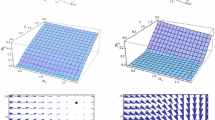Abstract
We formulate a class of dynamic games which consists of so‐called capital accumulationgames. In such games, rival firms invest strategically in a stock of physical capital. Thecapital stocks of all firms in the industry are the state variables of the game and firms usethe rate of change of the capital stocks as their control variables. It is assumed that currentprofits of a firm are not only dependent on the firm's own capital stock, but also on thestock of capital of the rival firm. We prove existence of multiple Markov Perfect Equilibria(MPE) and study their qualitative characteristics. It turns out that there exist two differenttypes of equilibria: a strict equilibrium that is degenerate and coincides with the uniqueopen‐loop one and so‐called indifferent equilibria that are non‐strict. For both types, westudy the equilibrium dynamics. While the strict equilibrium is characterized by simpleequilibrium dynamics, the indifferent equilibria may exhibit complex dynamic behaviour.
Similar content being viewed by others
References
R. Amir, A lattice-theoretic approach to a class of dynamic games, Computers and Mathematics with Applications 17(1989)1345-1349.
R.A. Dana and L. Montrucchio, Stationary Markovian strategies in dynamic games, in: General Equilibrium, Growth and Trade II: The Legacy of L. McKenzie, eds. M. Boldrin et al., 1993, pp. 331-351.
E.J. Dockner and H. Takahashi, Further turnpike properties of capital accumulation games, Economics Letters 28(1988)321-325.
E.J. Dockner and H. Takahashi, Turnpike properties and comparative dynamics of general capital accumulation games, in: General Equilibrium, Growth and Trade II: The Legacy of L. McKenzie, eds. M. Boldrin et al., 1993, pp. 352-366.
E.J. Dockner and G. Sorger, Existence and properties of equilibria for a dynamic game on productive assets, Journal of Economic Theory 71(1996)345-370.
E.J. Dockner, G. Sorger and N.V. Long, Analysis of Nash equilibria in a class of capital accumulation games, Journal of Economic Dynamics and Control 20(1996)1209-1235.
P.K. Dutta and R. Sundaram, How different can strategic models be?, Journal of Economic Theory 60(1993)42-61.
C. Fershtman and E. Muller, Capital accumulation games of infinite duration, Journal of Economic Theory 33(1984)322-339.
C. Fershtman and E. Muller, Turnpike properties of capital accumulation games, Journal of Economic Theory 38(1986)167-177.
D. Fudenberg and J. Tirole, Capital as a commitment: Strategic investment to deter mobility, Journal of Economic Theory 31(1983)227-250.
D. Fudenberg and J. Tirole, Game Theory, MIT Press, Cambridge, MA, 1991.
T. Li and J. Yorke, Period three implies chaos, American Mathematical Monthly 82(1975)985-992.
E. Maskin and J. Tirole, A theory of dynamic oligopoly. III. Cournot competition, European Economic Review 31(1987)947-968.
S.S. Reynolds, Capacity investment, preemption and commitment in an infinite horizon model, International Economic Review 28(1987)69-88.
S.S. Reynolds, Dynamic oligopoly with capacity adjustment costs, Journal of Economic Dynamics and Control 15(1991)491-514.
A.M. Spence, Investment strategy and growth in a new market, Bell Journal of Economics 10(1979) 1-19.
R. Sundaram, Perfect equilibria in non-randomized strategies in a class of symmetric dynamic games, Journal of Economic Theory 47(1989)153-177.
Rights and permissions
About this article
Cite this article
Dockner, E., Plank, M. & Nishimura, K. Markov Perfect Equilibria for a classof capital accumulation games. Annals of Operations Research 89, 215–230 (1999). https://doi.org/10.1023/A:1018927723944
Issue Date:
DOI: https://doi.org/10.1023/A:1018927723944




